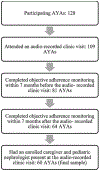Engagement and Affective Communication During Pediatric Nephrology Clinic Visits: Associations with Medication Adherence
- PMID: 32948401
- PMCID: PMC7933303
- DOI: 10.1016/j.pec.2020.08.039
Engagement and Affective Communication During Pediatric Nephrology Clinic Visits: Associations with Medication Adherence
Abstract
Objective: To evaluate whether engagement and affective communication among adolescents and young adults (AYAs) with chronic kidney disease (CKD), caregivers, and pediatric nephrology providers during outpatient clinic visits predicts antihypertensive medication adherence.
Methods: AYAs (n = 60, M age = 15.4 years, SD = 2.7, 40% female, 43% African American/Black) and caregivers (n = 60, 73% female) attended audio-recorded clinic visits with pediatric nephrologists (n = 12, 75% female). Recordings were analyzed using global affect ratings of the Roter Interactional Analysis System. Antihypertensive medication adherence was monitored electronically before and after clinic visits. A linear regression model evaluated associations between affect ratings and post-visit adherence.
Results: AYAs took 84% of doses (SD = 20%) pre-visit and 82% of doses (SD = 24%) post-visit. Higher AYA engagement (β = 0.03, p = .01) and the absence of provider negative affect (β=-0.15, p = .04) were associated with higher post-visit adherence, controlling for pre-visit adherence, AYA sex, age, and race, and clustered by provider.
Conclusions: Post-visit adherence was higher when AYAs were rated as more engaged and providers as less negative.
Practice implications: AYAs with lower engagement may benefit from further adherence assessment. Communication strategies designed to more actively engage AYAs in their care and diminish provider conveyance of negative affect during clinic visits may positively influence adherence among AYAs with CKD.
Keywords: Medication adherence; adolescent; chronic kidney disease; communication; physician-patient relations.
Copyright © 2020 Elsevier B.V. All rights reserved.
Conflict of interest statement
Declaration of Competing Interest The authors report no declarations of interest.
Figures
Similar articles
-
Patient-provider communication in nephrology care for adolescents and young adults.Patient Educ Couns. 2017 Sep;100(9):1680-1687. doi: 10.1016/j.pec.2017.03.026. Epub 2017 Mar 24. Patient Educ Couns. 2017. PMID: 28433407 Free PMC article.
-
Evaluating provider communication in pediatric chronic kidney disease care using a global coding system.Patient Educ Couns. 2020 Jul;103(7):1358-1365. doi: 10.1016/j.pec.2020.02.014. Epub 2020 Feb 10. Patient Educ Couns. 2020. PMID: 32147305 Free PMC article.
-
Communication during pediatric asthma visits and self-reported asthma medication adherence.Pediatrics. 2012 Oct;130(4):627-33. doi: 10.1542/peds.2012-0913. Epub 2012 Sep 3. Pediatrics. 2012. PMID: 22945409 Free PMC article.
-
Kidney adolescent and young adult clinic: A transition model in Africa.Pediatr Transplant. 2024 Mar;28(2):e14690. doi: 10.1111/petr.14690. Pediatr Transplant. 2024. PMID: 38436145 Review.
-
Use of Technology-Based Tools to Support Adolescents and Young Adults With Chronic Disease: Systematic Review and Meta-Analysis.JMIR Mhealth Uhealth. 2019 Jul 18;7(7):e12042. doi: 10.2196/12042. JMIR Mhealth Uhealth. 2019. PMID: 31322129 Free PMC article.
Cited by
-
Text messaging to improve connection between adolescents and their health care providers.Digit Health. 2025 Jan 15;11:20552076241309228. doi: 10.1177/20552076241309228. eCollection 2025 Jan-Dec. Digit Health. 2025. PMID: 39822302 Free PMC article.
-
Social determinants of health and quality of life in children with chronic kidney disease: insights from Saudi Arabia.BMC Nephrol. 2024 Aug 24;25(1):272. doi: 10.1186/s12882-024-03710-y. BMC Nephrol. 2024. PMID: 39182016 Free PMC article.
-
Medication adherence in youths with CKD: habits for success.Pediatr Nephrol. 2023 Nov;38(11):3791-3802. doi: 10.1007/s00467-023-05976-0. Epub 2023 Jun 12. Pediatr Nephrol. 2023. PMID: 37306720 Free PMC article. Clinical Trial.
References
-
- Hommel KA et al., “Adherence to Pediatric Treatment Regimens”, in: Roberts MC and Steele RG, Handbook of Pediatric Psychology, Fifth Edition. Guilford Publications, New York, 2018.
-
- Pruette CS, Cobum SS, Eaton CK, Brady TM, Tuchman S, Mendley S, Fivush BA, Eakin MN, Riekert KA, Does a multimethod approach improve identification of medication nonadherence in adolescents with chronic kidney disease?, Pediatr. Nephrol. Berk Ger. 34 (2019) 97–105. 10.1007/s00467-018-4044-x. - DOI - PMC - PubMed
Publication types
MeSH terms
Grants and funding
LinkOut - more resources
Full Text Sources
Other Literature Sources


